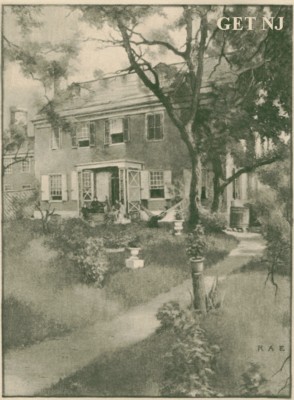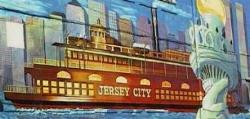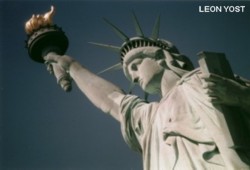 |  |  |
|
| ||
 |  |  |
 |  |  |
|
| ||
 |  |  |
|
|
|
Historic Houses
Trenton
From Historic Houses of New Jersey by W. Jay Mills, 1902
THREE-QUARTERS of a mile
out of Trenton proper, on the
Lalor Road, one comes to the
famous De Klyn Lane, a good
half-mile long, leading to Bow
Hill. Mounting the little rise
of land to the old white gateway
guarding it, one seems to be surrounded by all the great factories of Trenton; but once
in the lane itself, they are forgotten. Straight ahead in
the distance the old red-brick house stands like some
fading eighteenth-century picture shut away in a forgotten world. In its early days an isolated situation led
Joseph Bonaparte to select it as a retreat for his beautiful
Annette Savage, and after a hundred years it is still sequestered. The wanderer in the lane approaching it will
never forget the picture, especially if the season in which
he comes there is the spring. Hoary-headed pine-trees
and acres of golden daffodils surround it. Robins and
bluebirds twitter a welcome, and the murmuring Delaware in the distance and the wind among the pussywillows sigh one. The daffodils bend and sway like
Wordsworth's merry crowd, and beckon one nearer,
and the sad face of the old house itself seems to say,
"Come and rest awhile, and I will tell you the stories
that lie buried in the hushed chambers of my heart."
"Beau Hill" the wits of Trenton used to call it when
Bonaparte took his uncrowned queen there in one of the
first summers of the twenties, but Bow Hill was the
rightful name given to it by its owner, Barnt De Klyn,
shortly after its erection, a few years succeeding the Revolution. Barnt De Klyn, or D'Klyn, as the name used to
be written, was a descendant of the Huguenot French
nobility, and was born in the city of Boston. In his
youth he enjoyed all the advantages of wealth and
education, and on coming of age he married Mary Van
Zant, a member of a prominent Knickerbocker family
living in the vicinity of Pearl Street, New York City.
During the Revolution he engaged in the cloth trade,
and supplied large quantities of material to the army.
So great was his success in this mercantile venture that
in a few years he amassed an immense fortune, which
enabled him to retire in a large measure from the business world.
Long before there was any talk of making Trenton
the capital of the United States Barnt De Klyn purchased a large tract of land along the Delaware, and
during the long discussion in the eighties, when all eyes
were turned to Trenton as the most probable seat of the
federal government, he added hundreds of acres in the
vicinity to his estate. When the crushing year of 1790
came with its fateful tidings that a site on the Potomac was the selected spot, he found himself miles away from
the real field for speculators. Although crushed for a
time, he still possessed an ample fortune, and soon de-cided to improve his large estate and his recently constructed mansion, then one of the finest dwellings in
New Jersey.
|

|
Tradition says that this gentleman of yesterday lived in all the splendor of a liege lord of the soil. Surely no English or French nobleman of the period was ever waited on more faithfully by his retinue of foot-boys, flunkeys, and cup-bearers than Barnt De Klyn was by his slaves. Haughty of spirit, but kind withal, he lived with his wife and only daughter, Kitty De Klyn, in a little monarchy of his own, close by the world of Trenton. Kitty De Klyn was her father's idol, and he lavished every luxury an ample purse and whimsical fancy could procure for her. Her character was a curious mixture of a hoyden and a saint, and those who still remember her as an aged grandame living in state in Trenton speak of her as something akin to the latter. Her lengthy will, with its many bequests, has been called the most beautiful document among those of the same character ever devised by a woman of New Jersey. A few years before the close of the eighteenth century the petted daughter was sent to an elegant boarding-school near the City Hall, New York City, to complete her education and to fit herself for a brilliant future as mistress of Bow Hill. Then about fourteen years old, she was already a favorite in Trenton society. She had been one of the little flower-maidens who had taken part in the memorable welcome to General Washington when he passed through the city on his way to his inauguration as Presi- dent, and enjoyed great local fame for her dancing. Her love for this pastime seems never to have abated, for it is related of her that as an old lady of eighty-five years, on her last visit to Bow Hill, she alighted from the steps of her ancient carriage to trip the rollicking "Wild Irishman" adown the wide hall with a troop of merry chil- dren.
Kitty was truly a kittenish schoolgirl in more than name, for she soon grew tired of her boarding-school and ran off with a handsome young Irishman, whose fine eyes and melodious voice had made a deep impression on her susceptible heart. Her elopement was almost as romantic an affair as that of the famous Charlotte Temple. The young people had met first when the girls were out for a promenade with their teachers, and had fallen so in love with each other that after a few subsequent meetings at the Battery, or on Broadway, the maiden consented to leave her room by a ladder at night, climb a garden wall with her lover, and hurry off into the darkness to rouse some good parson to make them man and wife.
How the rooms of Bow Hill echoed to the storm of a father's rage when Barnt De Klyn learned that the darling of his heart had forgotten her high name and the plans made for her career, and had married a penniless Irishman. For a year he never spoke of her, and would not open her letters; but one day his heart melted, and Kitty and her handsome husband rode up the old lane to Bow Hill, and were received with open arms. Much more could be written of the fascinating Kitty, but we must on to the greatest romance in the annals of the old house. The love of a king and a poor little descendant of the Quakers.
Some time after the Princess Zenaide and her husband left our shores for Italy, Joseph Bonaparte, so the story goes, induced his friend Barnt De Klyn to rent Bow Hill to him for a summer or two as a retreat for the fair Annette Savage. Many tales have been told of this American wife of King Joseph. Her mother and herself are said to have conducted a small dry-goods shop in Philadelphia at the time Bonaparte met them, and it is traditional gossip that the brother of Napoleon I fell in love with the dark-eyed maiden as she sold him suspenders over her little counter. For a time he lived with her in the city of Philadelphia, and later installed her in a villa some distance below the city proper. The blue-blooded aristocracy of the Quaker City looked on the amour with horror, and the little Quakeress was made to feel all the cruel stings which spring from virtuous indignation. The count, who was very fond of society, looked in vain for the familiar equipages of friends in his driveway. When he gave parties, half the invited guests were sure to send regrets. Finally, becoming enraged at what he termed "insults," he decided to go back to Jersey. Wishing to secure a mansion that was beautiful as well as sequestered, he persuaded his friend Bamt De Klyn to rent him Bow Hill, and he in return for the privilege gave him the use of another villa he owned in Trenton. Little is known of Annette Savage's life at Bow Hill to-day, although the house is still in the possession of a descendant of Barnt De Klyn, Miss Caroline Lalor. Her love for her ancient abode amounts almost to a worshipful veneration, but the subject of Bonaparte's stay there was always prohibited in family conversation by her father. A secret door in the wall of Annette Savage's room, through which Bonaparte used to enter, is still shown to interested visitors. On one of her window-panes facing the Delaware is the sentence "God is love," scratched with a diamond, and it is a family tradition that it was her work.
Eighty years ago it was very lonely at Bow Hill, for it is shut away from the world to-day. Then there were no houses of any pretension between it and Trenton. Very often the poor little Annette must have longed for her humble sphere when she heard of the parties and galas a few miles distant where she was never invited. Trenton society followed the lead of Philadelphia, and very few, if any, of the ladies of the city called on her. Even Barnt De Klyn, Bonaparte's friend, afterwards regretted that he had allowed his house to be stigmatized by an affair of the heart entailing so much scandal. Stung at the ostracization, she made several pitiful attempts to enter the charmed circle, but the only attentions paid her were from the wives of the followers of the Bonaparte fortunes. One comfort she had besides Joseph's love for her, and that was her baby daughter Charlotte. This child grew to a noble womanhood, and in after years her sweetness and charm led Napoleon III. to legalize her mother's union with his relative and present their daughter to the French court as his cousin.
A beautiful picture Annette Savage and her child must have made in the rustic walks then leading in all directions from the house. Jacob, Bonaparte's tall and muscular Hungarian body-guard, was their devoted attend- ant, and he is said to have been a striking figure in his gay uniform. The mother, with his help, was the one who planted the multi-great-grandparents of the present field of daffodils which climb up the banks of the Delaware almost to the very windows of the front rooms. The fragrance and beauty of flowers at that time often pierced the heart of the little woman, for she had lost her first-born child, a daughter, through the fall of a flower-pot, which had instantly killed it.
The spring of the year 1822 is the time Bonaparte left Bow Hill. The seclusion no doubt palled upon him; and after a visit to his great mansion at Bordentown he started on a long journey to the wilds of Central New York. Several years before in France, when a pursued fugitive, he had purchased an immense estate in Jefferson County from a member of the De Chaumont family, and thither he was bound. In the town of Diana, which he named and founded, he built an imposing villa, called the White House, and there Annette Savage presided as mistress until the Revolution of 1830 called him back to France. Many distinguished Frenchmen sought the hills of the poetically-named Diana in those years. Among them were Marshal Brouchy, Count Peter Francis Beal, the Duc de Vincence, and many others. The White House, only recently destroyed, was the scene of much lavish hospitality during Bonaparte's stays there, and it is said that in its rooms many deep-laid plans were made for the rescue of "The Little Emperor" languishing at St. Helena, – but they were always frustrated by the malignant Fate then hovering over the Man of Destiny. After Joseph Bonaparte's return to Europe and his ex-queen at Lake Geneva, Annette Savage married Joseph de la Foille, a young Frenchman of good family then at Diana. Joseph Bonaparte must have been forgetful of her love, and could not have left her much at the last, for she is said to have gone back to her old vocation and supported her family in Watertown by keepng a small store. Perhaps the happiest days of her life were those at beautiful Bow Hill, for she endured much sorrow in her latter career. The child Charlotte, the daughter of a king, who revelled in the rustic shades along the Delaware, lived a life fully as romantic and as sorrowful as her mother's. She died a few years ago at Richfield Springs, and there are many people yet living who love to repeat the wonderful tale of her origin, stranger than fiction.
Bow Hill to-day seems to remember Joseph Bonaparte and his little Quaker love. Elegant souvenirs of the Empire linger in the mouldy drawing-rooms. Even the aged striped curtains at some of the windows tell of the severe classicism of that period. Annette Savage is forgotten by the great world, but Bow Hill still whispers what is known of her story. So many generations have lived out their lives under its old roof it cannot remember much. Standing before it in the twilight, and saying good-bye, it looks like some aged grieving mother longing for the children who have left her. One almost hates to leave it alone with the gloomy night as he hurries down the De Klyn Lane out of which poor little Annette Savage rode so many years ago.
 Your Ancestors' Story |
 Bruce Springsteen's Jersey Shore Rock Haven! |

|
UrbanTimes.com |